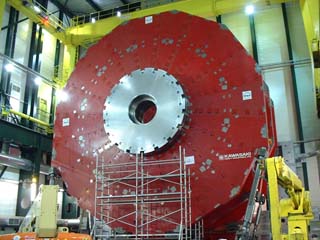End-Cap Yoke Delivered to CERN
Nov. 05, 2001

Kawasaki has delivered an end-cap yoke (a special magnetic shield) for the CMS Project to the European Laboratory for Particle Physics (Conseil Europeen pour leRecherche Nucleaire, or CERN) headquarters in Geneva, Switzerland. Ordered by the University of Wisconsin, the end-cap yoke is destined for the Large Hadron Collider (LHC) being built near the Swiss and French border by CERN. The end-cap yoke will be fit into the CMS, a special magnetic field particle detector, which is a constituent element of the LHC.
When the LHC starts up in 2005, it will be able to collide speeding protons, or heavy atomic nuclei, head on at 14 trillion eV. Scientists are attempting to reproduce conditions one one-trillionth of a second after the Big Bang, and to find the Higgs particle - or "God particle" - which is expected to explain the origin of all mass.
Kawasaki's end-cap yoke is a nearly 4,000-ton structure consisting of four steel disks 60 cm thick and 14 m in diameter, and two steel disks 23 cm thick and 14 m in diameter. The yoke will provide support for a muon detector, a device for verifying the presence of the Higgs particle, that will be placed in each disk. The other role of the yoke is to keep the magnetic field undisturbed when the detector is used in a strong magnetic field. The end-cap yoke is made of special carbon steel.
Kawasaki supplies many research institutes with detection equipment, including the barrel cryostat (high-precision aluminum vacuum cryogenic storage) delivered to CERN. Kawasaki itself is engaged in accelerator systems research efforts. In the FEL (free-electron laser) field, Kawasaki produced the world's first visible-light FEL oscillator in 2000.





